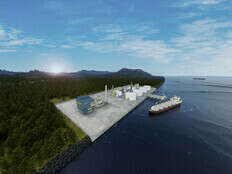- Agreement covers up to six ammonia cracking plants with a total capacity of 7,200 mtpd.
- Pre-FEED phase for Wilhelmshaven plant is underway, with FEED phase starting end of next year.
- Demonstration plant in Gelsenkirchen-Scholven has a capacity of 28 mtpd.
- Project aims to establish scalable hydrogen import infrastructure for Europe.

Framework Agreement
Uniper and thyssenkrupp Uhde have signed a framework agreement to construct commercial ammonia cracking plants. This agreement includes license packages for up to six plants, with a total capacity of 7,200 metric tons of ammonia per day. The initiative aims to support the decarbonization of European industry by facilitating hydrogen import infrastructure.
Project Details
The agreement outlines the use of thyssenkrupp Uhde’s ammonia cracking technology at Uniper’s planned hydrogen import terminal in Wilhelmshaven. The license package encompasses engineering, services, and the supply of main equipment and catalysts. Uniper is advancing the pre-FEED phase for a commercial plant at Wilhelmshaven, which will establish the design basis and assess the project's technoeconomic feasibility. The FEED phase is scheduled to commence at the end of next year.
Demonstration Plant
In spring 2025, Uniper and thyssenkrupp Uhde announced the construction of a demonstration plant for ammonia cracking at the Uniper power plant site in Gelsenkirchen-Scholven, Germany. This plant, with a capacity of 28 metric tonnes of ammonia per day, serves as a technological foundation for the commercial scale-up now agreed upon. The demonstration plant is funded by the Ministry of Economic Affairs, Industry, Climate Action and Energy of the State of North Rhine-Westphalia.
Strategic Importance
The project is a critical step toward establishing a resilient energy infrastructure in Europe. Ammonia, as a transport and storage medium, offers a viable solution for hydrogen logistics, addressing the challenges of direct hydrogen transport. This initiative is expected to play a significant role in ensuring energy security and supporting the sustainable transformation of energy-intensive industries.

